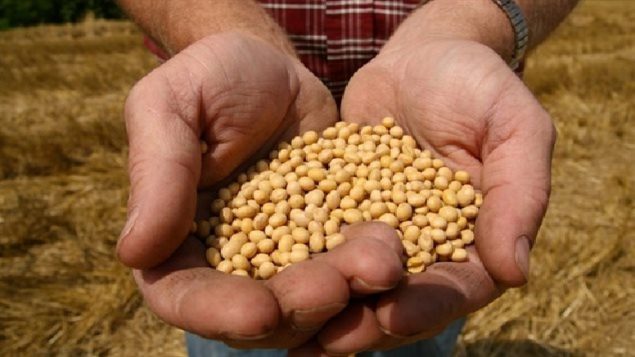Multi-billion dollar Bayer takeover of Monsanto conditionally approved
In recent years, multinational chemical and bio-tech companies have engaged in mega mergers. Where once there were eight major entities in the worldwide seed, chemical and development fields, Dow and Dupont merged, then ChinaChem and Syngenta, and this week initial approval in the U.S for Bayer and Monsanto to merge, following EU initial approval.
Farmers around the world have been saying this doesn’t bode well for them, nor for consumers.
Dairy farmer Jan Slomp, is first Vice President, Policy for the National Farmers Union in Canada.
ListenThis week, Bayer, a company generally associated with the chemical industry and Monsanto, general associated with bio-technology received conditional approval by the U.S Department of Justice for the merger. This followed similar initial approval in Europe in March.

Dairy farmer Jan Slomp, VP- National Farmers Union Photo: NFU
Bayer AG will take over Monsanto in a deal worth over $62 Billion.
There are some conditions attached, Bayer will sell off its glufosinate weedkiller, which is in direct competition to Monsanto’s “Roundup”, and will also sell its soy and cottonseed interests and some of its digital farming interests. All will go to German competitor BASF.
Digital farming is a very new technology concept involving sensors, software and precision machines, and is being developed by seeds and pesticides interests such as Monsanto which will retain its digital farming system in the new mega firm.
Slomp says these mergers do not bode well for the future.

In 2016 when the Bayer takeover of Monsanto was underway, University of Manitoba Prof. Derek Brewin SAID
farmers could be left paying higher prices for canola seed, The new single company adding 93% of canola seeds in Canada would now be controlled by the single company. Photo: Shutterstock
While some have said it takes only two firms to have competition, Slomp says farmers are far from convinced. He says with so few players, prices and markets around the world for seeds and chemicals are more easily controlled.
Also he says, development of plant varieties with natural resistance to pests or disease will be much less of a priority. He says developing natural resistance would be against their own interests to sell their
chemical pest and disease control products.
Also he says, with such huge penetration of the market by this now very few mega-firms, there could be fewer and fewer varieties of crops available as each company seeks to develop and promote its seeds, often genetically modified.
He says this has already happened to Canada’s canola crops, where they are now almost all Monsanto’s GMO variety. This is due to lawsuit chill after Monsanto aggressively sued farmers whose crops became accidently crosspollinated with Monsanto’s proprietary variety which was blown onto their fields by the wind.
Adding to the concern is that fact that previous Canadian governments sold off Canada’s publicly owned plant research sector, leaving very little public input into crop research and development which again gives more control to the mega firms.
Another merger that will affect farmers worldwide, and ultimately consumers, involves rival Canadian fertilizer giants Potash Corp and Agrium. The deal to create an approximately $40 billion company was officially approved this year, The new company is known as Nutrien has some 20,000 employees in 18 countries.
additional information-sources







For reasons beyond our control, and for an undetermined period of time, our comment section is now closed. However, our social networks remain open to your contributions.